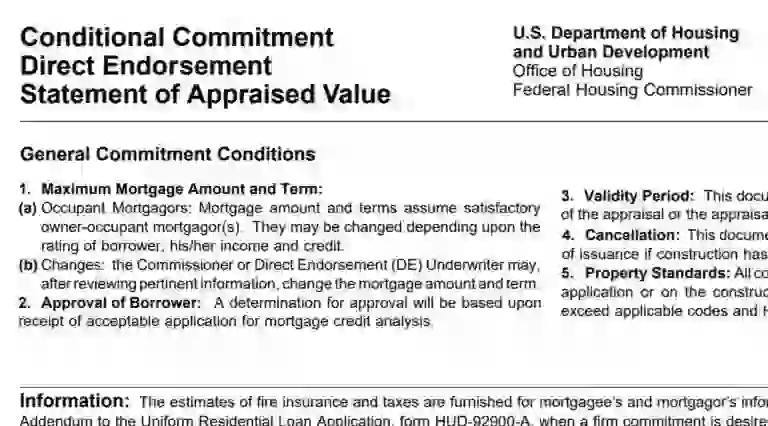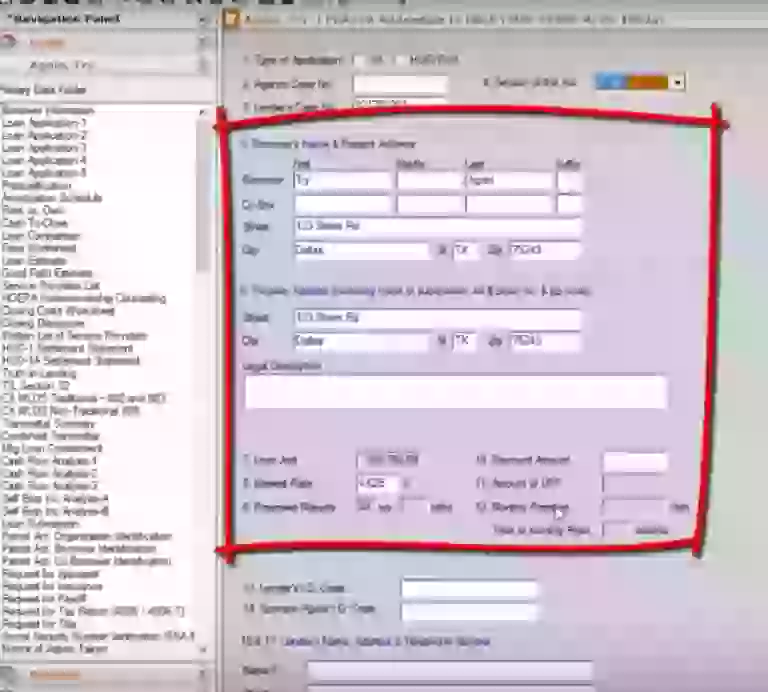FHA Identity Of Interest Guidelines
FHA Identity Of Interest: When Is The 15% Down Payment Applicable?
FHA identity of interest guidelines require borrowers to declare the affiliation between the borrower and the seller 1 and provide a downpayment of fifteen percent (15%) of the value of the object acquired with an FHA mortgage loan. 2
The reason for this high downpayment 3 is the special relationship between the participants of the transaction. 4 The formal declaration of the identity of interest avoids mortgage fraud. 5
The FHA identity of interest is a legal situation of affiliation between the prospective buyer and the seller that can be a distortion of fair market values, thus enforcing both contractual parties during an FHA loan to declare this special relationship to avoid mortgage fraud.
The consequence of the FHA identity of interest is that the borrower is obliged to perform a down payment of 15% and observe an LTV ratio of not more than 85%.
When we analyze the satisfaction of the strict FHA loan requirements, the identity of interest means there’s a preexisting connection between the property’s buyer and the seller, such as a family or a business relationship.
This can refer to a transaction between a parent and child, a corporation and employee, or people related through other affiliations.
In this sort of transaction, it is thought that the buyer is not paying the property’s fair market value. In other words, it seems like the buyer is receiving a wonderful bargain on the property since it is unlikely to be placed on the market and at fair value. Consequently, other prospective purchasers will not have the chance to bid for it. While this may be advantageous for the borrower, the US government will not endorse it in the FHA loan as this mortgage loan is backed by the federal government
These transactions are singled out because there’s a good chance that the buyer is not paying the fair market value of the property.
If you are purchasing your relatives’ house, for instance, they may offer you a terrific price. They may likely earn more money by putting their house up for sale and enabling interested parties to compete for it. However, since you are their kid, they do not want to benefit from your misfortune. Therefore, this is not an open-market transaction; you are receiving an exclusive offer.
This treatment would, generally speaking, not be an issue in the open mortgage market. However, FHA loans are mortgage loans backed by the US federal government.
How Can FHA Identity Of Interest Affect Borrowers?
So, how does an FHA identity of interest apply to you as a borrower? Well, the identity of interest can affect FHA lender down payment requirements. FHA lenders usually require a minimum down payment of 3.5% of the home’s purchase price. However, if it’s an identity of interest transaction, you can expect the requirement to increase to 15% of the purchase price. Therefore, as the buyer, you must come up with a bigger down payment to receive an FHA loan approval.
Usually, government loans like FHA loans offer lower down payment requirements. This is because government loans are guaranteed by the federal government, therefore reducing the lender’s default risk.
Government loans are usually appealing to households that have low-to-moderate income levels and have not set aside a significant amount of money for a down payment.
So, if you are planning to purchase a property from someone you know, selecting an FHA loan may not be the most appealing option.
FHA Handbook, Hud Handbook, And The Identity Of Interest
Let´s see how the FHA Handbook, actually HUD Handbook to be more precise, will describe this identity of interest.
The FHA loan handbook, HUD 4000.1, describes the identity of interest transactions as a real estate sale between two parties “with an existing Business Relationship” or between family members.
The word “interest” in this case refers to the interest the seller has in selling the home to the buyer based on a tenant/landlord relationship, business relationship, or similar associations.
Such transactions are not forbidden by FHA loan rules but do require a higher down payment under the right circumstances. HUD 4000.1 explains:
“The maximum LTV percentage for Identity-of-Interest transactions on Principal Residences is restricted to 85 percent. The maximum LTV percentage for a transaction where a tenant-landlord relationship exists at the time of contract execution is restricted to 85 percent.”
There are exceptions, and you should definitely know what these exceptions are going into your home loan application.
For example, the 85% LTV is waived for transactions where the borrower is purchasing “the Principal Residence of another Family Member…or a Property owned by another Family Member in which the Borrower has been a tenant for at least six months immediately predating the sales contract. A lease or other written evidence to verify occupancy is required.”
But what about situations where the seller is not a family member? Are there exceptions to the identity of interest rules in such cases? Yes, under limited circumstances:
“The 85 percent LTV restriction may be exceeded if the current tenant purchases the Property where the tenant has rented the Property for at least six months immediately predating the sales contract. A lease or other written evidence to verify occupancy is required.”
VA Mortgage Identity Of Interest
VA mortgages behave in a similar way to FHA loans when we discuss the identity of interest.
A VA mortgage identity of interest situation is a transaction for the purchase of a principal residence between one of the following:
- Parties where the veteran has a familial or business relationship
- Business affiliates where the borrower is a qualified veteran.
In these situations, it is understood that because of the affiliation between the seller and the veteran, there is no fair market value in a VA mortgage that is a government-backed mortgage loan.
An identity of interest transaction does not include an employer/employee transaction when the employee is purchasing the seller’s principal residence.
Maximum financing is permitted for the identity of interest transactions on principal residences.

FHA Non-Arms Length Transaction Guidelines
FHA identity of interest is also known as an FHA non-arm’s length transaction in real estate transactions involving other types of mortgages.
But, regarding FHA loan terminology, you’ll hear this transaction referred to as identity of interest and not as a “non arms length” transaction.
The FHA Conflict Of Interest Situation
It refers to the specific interest that the seller of a real estate object may have in offering this object for sale to the interested party, the buyer, where these parties: prospective buyer and seller, are bound by an existing relationship that can be contractual or familiar, as we explain below.
- Parties have a family relationship
- Involved participants are employees and their employers
- Parties have a business partnership
- One party is the tenant and the other is his landlord.
The business transactions where an FHA identity of interest is verified, are not prohibited or discouraged at all by FHA lending regulations. However that FHA identity of interest requires that the FHA lender solicits the buyer higher down payment.
Thus, HUD 4000.1 has clear instructions in this matter:
The maximum Loan To Value percentage for FHA identity of interest operations on principal residences is restricted to eighty-five percent (85%) Likewise, the maximum loan-to-value percentage for a business transaction wherein a valid rental contractual relationship between the tenant and his landlord is still existing at the moment when the contract is executed is restricted to this aforementioned eighty-five percent (85% percent).
The loan-to-value, that we have mentioned above, is a ratio representing the quantity of the loan as a percentage of the valuation of the real estate object, which is the “property”.
We mention these FHA identity of interest guidelines frequently to our readers. It is important to discover it and declare it to the seller as soon as you enter into negotiations. It would be a problem if, at the moment of closing, the borrowers discovered that the down payment should be 15 % instead of a 3,5 % that they were initially expecting to pay.
Apart from this requirement, the borrower or homebuyer must always fulfill the FHA loan requirements within the loan limits defined for that year.
FHA Family Member Definition
The FHA defines family members as spouses, parents, children, siblings, stepchildren, grandparents, grandchildren, aunts, uncles, and first cousins. In addition, the FHA also includes legal guardians and foster children as family members.
It is important to note that the legal FHA’s definition of family members is broader than the traditional definition of family, which only includes blood or marriage relations.
When applying for an FHA loan, the borrower will be asked to provide information about any co-borrowers, including their relationship to the borrower. The lender will also typically verify the relationship through documentation such as birth certificates, marriage certificates, and adoption papers. In cases where the relationship is not clear or there is some doubt about whether a person qualifies as a family member, the lender may ask for additional documentation or seek clarification from the FHA.
The FHA identity of interest concept is designed to prevent conflicts of interest when it comes to buying or selling a home with an FHA-insured mortgage. It applies when the buyer, seller, or other interested party is a family member or has a personal relationship with the borrower. The term “personal relationship” includes any relationship that could create a conflict of interest, such as a business partnership or a close friendship.
Under the FHA’s identity of interest rules, the seller cannot be a family member of the borrower unless certain requirements are met. For example, if the borrower is buying a home from a family member, the sales price cannot be more than the seller’s documented purchase price. This is to prevent inflated prices from being used to funnel money to family members or associates.
Let’s say that John is a borrower who wants to purchase a home from his brother, Tom. The home has a purchase price of $300,000, which is the amount Tom paid for the property when he bought it a few years ago. John applies for an FHA-insured loan to purchase the property. Because Tom is John’s brother, the FHA considers him to be an “identity of interest” and has specific rules about the transaction.
In this case, the sales price of $300,000 cannot be exceeded, even if the appraised value of the property is higher. This is to prevent Tom from making a profit on the sale of the home to his brother, and to ensure that John is not overpaying for the property. Additionally, John will need to provide documentation to prove that he has the ability to repay the loan and is not receiving any financial assistance from Tom or any other interested party.
Exceptions To The FHA Identity Of Interest Guidelines
Of course, to those “FHA identity of interest” guidelines explained above, there are some exceptions where the borrower and prospective buyer is waived from executing that down payment of 15% and he will be paying the standard 3.5% of downpayment anyway, despite the existing affiliation between parties.
Therefore, there are cases where the eighty-five percent loan to value formulation is waived, which we describe below in the following non-exhaustive list.
Principal Residence And Family Members
The eighty-five percent (85%) Loan To Value will be waived for business operations where the borrower is acquiring “…..the Principal Residence of another Family Member….or a Property owned by another Family Member in which the Borrower has been a tenant for at least six months immediately predating the sales contract…..”
The borrower is here obliged to accomplish the indications of the FHA rules of occupancy: Therefore he has to perform the physical occupation of the home (the real estate object of the FHA mortgage loan) as the primary residence. In that case, he will execute a downpayment of 3,5 %
Thus, the 85% LTV is waived for transactions where the borrower is purchasing “the Principal Residence of another Family Member…or a Property owned by another Family Member in which the Borrower has been a tenant for at least six months immediately predating the sales contract. A lease or other written evidence to verify occupancy is required.”
But what about situations where the seller is not a family member? Are there exceptions for the identity of interest rules in such cases? Yes, under limited circumstances, let´s see them in detail.
Employee Of The Builder
Case of the employee of the builder. There is another exception for the eighty-five percent loan-to-value ratio restriction, that may be exceeded “…..if an employee of a builder, who is not a family member, purchases one of the builder’s new houses or models as a principal residence…..”
Relocation Of An Employee
In the case of corporate transfer of employees, the loan-to-value (or simply LTV) restrictions may be exceeded, when a corporation, as a registered legal entity, “…..transfers an employee to another location, purchases the employees house, and sells the house to another employee.”
This is a typical case in corporations, seen very often in the market. An employee is relocated. To facilitate his relocation process, the company purchases him his house in the former location. That home is resold by the corporation to another employee: there is an identity of interest identified. However, here we have an exception to the general principle. The employee buying the home is allowed to perform the minimum down payment.
Tenant Purchases The Property He Is Renting
A typical situation in the market also is when the tenant wants to buy a property he occupies through a contractual relationship that can be either a rental contract, a VA lease, a lease contract, or a lease with an option to purchase.
“The 85 percent LTV restriction may be exceeded if the current tenant purchases the Property where the tenant has rented the Property for at least six months immediately predating the sales contract. A lease or other written evidence to verify occupancy is required.”
In these cases, the borrower must live in the property for at least six months before the sales contract agreement. Lender standards, state law, and additional requirements may also apply above and beyond the FHA loan rules we have covered here.
The FHA strict rules enforce a mandatory occupancy of the home for more than six months in order to be eligible for the standard down payment (3.5%). If the tenant (here also the borrower and prospective buyer of the real estate object) has lived in the home for less than six months, he is subject to the FHA identity of interest guidelines that as we know, enforce him to perform a downpayment of 15 %. Obviously, to trigger the exception and be eligible for the standard down payment, I will recommend the tenant to stay for more than six months physically living in the home.
So this eighty-five percent of loan-to-value restriction may be exceeded also in the relationship between tenant and landlord when the tenant acquires the real estate object “…..if the current tenant purchases the Property where the tenant has rented the property for at least six months immediately predating the sales contract…..”. Here it is advisable for the prospective borrowers to consider how the six months rule may affect them and make some planning in advance, before applying to the loan. When this exception applies, the borrower will be subject to the standard down payment of 3.5 % only as we thoroughly described above.
In all these cases, I can recommend by experience, that the relationship between the landlord and the tenant has to be documented through a rental or lease contract, or any written evidence that also includes a mention of the starting date (dies a quo) of the relationship. Also, I will recommend the tenant to collect the utility bills that can serve as evidence, along with the lease or rental contract.
If the tenant has a lease contract with an option to purchase and is forced to exercise that contractual option without having time for the six months occupancy required by the FHA identity of interest guidelines, he can simply perform the higher down payment. Another possibility is to move into a different non-FHA mortgage loan.
Additional Exceptions At State Level
Additional exceptions to the FHA identity of interest guidelines may be existing at the state level may apply. In several articles, we are covering regulation from each of the states that may influence the FHA identity of interest conception.
FHA Identity Of Interest Forms
There is available a model of an FHA identity of interest certification form that you can directly download for free here and read a short explanation about how to use it.
This form has to be signed by the borrowers who incur one of the causes of the identity of interest and explain, if feasible, why they are eligible to an exception.
It is important that borrowers and FHA lenders align early in the discussion in regards to the content of this FHA identity of interest form. If they align later at the end of the closing stage, the borrower can even discover that he is unable to complete the 15% down payment required.
In the form, you will have to complete the names of the applicants, the address of the object of the FHA mortgage loan, the address of the property, identification of the property, disclosure of the identity of interest situation, and the signature at the end. Write down always true statements as lying in the form could be regarded as mortgage fraud (Source).
Download the FHA Identity of Interest form here.
FHA Connection And The Identity Of Interest
After the form is completed declaring the FHA identity of interest, the lender would enter the information in the corresponding case inside the FHA Connection portal.

I am David, economist, originally from Britain, and studied in Germany and Canada. I am now living in the United States. I have a house in Ontario, but I actually never go. I wrote some books about sovereign debt, and mortgage loans. I am currently retired and dedicate most of my time to fishing. There were many topics in personal finances that have currently changed and other that I have never published before. So now in Business Finance, I found the opportunity to do so. Please let me know in the comments section which are your thoughts. Thank you and have a happy reading.




